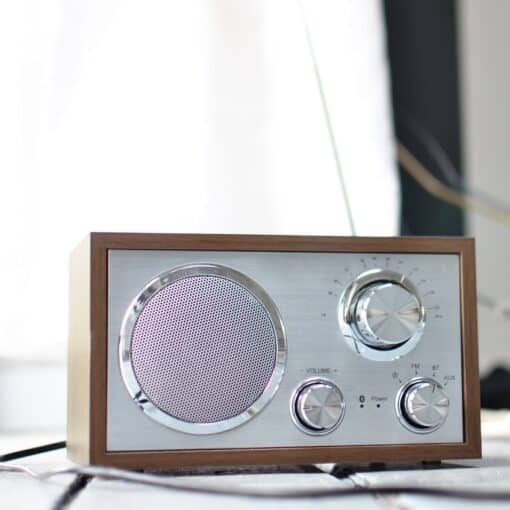When it comes to owning and using an amateur radio, the word itself ‘amateur’ can be quite misleading. Much like the nickname ‘ham’, it gives off the impression that the operator is untrained, doesn’t know what they’re doing, and blundering their way through it. But I know for a fact that Olympic figure skaters are referred to as amateurs, so there should never be too much stock put into that word. So how much of amateur radio is actually amateur?
None of it. In order to broadcast on a ham radio, you needto pass an exam that will give you a license. Though you don’t need a licenseto listen in, if you want to actually transmit across radio, the license exammust be passed. It’s much like the way driver’s licenses work. You don’t needone to be a passenger, but you need one to be a driver—and having one is proofthat you possess the knowledge and skills to be comfortable working with theequipment.
Amateur radio has been licensed and regulated for almost as long as it has existed. Because of the sheer amount of people who have begun to connect and broadcast over the years, there needed to be some kind of law set in motion to ensure that ensured the airwaves would be clean. With the advent of amateur radio growing in popularity during and after the World Wars, it became necessary to ensure that whatever was being broadcast was clean, but also to ensure that the people involved knew what they were doing. The license testing is not exactly rigorous, but it does ensure that the licensee is not stumbling blindly into the field. It also became necessary to monitor the people who broadcast—perhaps ‘monitor’ is the wrong word, but imagine what kind of illegal activity someone could conduct across ham radio, which can reach across oceans. Apart from being a signal of your knowledge, the licensing system is also there as a safety measure to protect the country. So the term ‘amateur,’ in this case, is not at all indicative of someone untrained or ‘ham-fisted.’ Unlike CB radio, which is open to anyone, amateur radio is home to a passionate community of individuals to take pride in their craft.
Exams in Different Countries
Not every country has the same regulated licensing process. While all amateur radio is overseen by the International Telecommunications Union, most countries have their own national agency that deals with communications. The most well-known example of this is the Federal Communications Commission in the United States. As the rules of broadcasting differ slightly between each country, the terms of the license are altered to fit. Most exams are in a written or question-answer format, but some countries require a demonstration of your knowledge as well. Countries that require demonstrations include Australia and the United Kingdom.
How to Take the Exam
The first thing to do is research. Make sure you know what agency is in charge of your country’s communications, find their website, and read up on all of their rules. If you already have a radio set up, you can start listening to stations to get the feel of the lingo—there’s no required license for listening. You can also use several online resources to listen to ham radio through your computer if you are curious but haven’t invested in a radio yet. A great resource for information is ham radio clubs. Most cities have one, and all it should take it a cursory Internet search to find the one in your city. Nine times out of ten, it’ll be under the name “X City Amateur Radio Club.”
Different License Classes
While it differs from country to country, the United States and Canada are two examples of countries who issue licenses by classes. The first exam you take would be for a Technician’s License, for example. It limits you to certain bands, keeping you on the lower frequencies. It is not done out of nepotism or for the sake of keeping people out of ham radio. It’s just another safety precaution. The UHF bands are often used by government officials and emergency services, and a good many of them use Morse code to communicate. Some bands are relegated to Morse code only. So in order to operate on those bands, it needs to be proven that the user knows Morse code, and won’t be obstructing the airwaves for those services. In order to operate on the VHF (Very High Frequency) or UHF (Ultra High Frequency) bands, you need to take another exam for an upgraded license.
Once you feel ready to take the exam, the next step is to find a location that offers it. If you don’t already know, there’s an excellent resource on ARRL.org, to search for exams in your area. For other countries, there are other online searches you can look for. When it comes to the Technician Class license, the first one you would take, there are a possible 426 questions. Of those, you will be given 35 questions. Much like with a learner’s class driving test, you won’t need to get all the questions correct. A pass is 26 right answers, as 74% grade. Moving up classes involve more questions drawn from a larger pool. The Extra Class license has 50 questions pulled from a possible 712.
Training for the Exam
When getting the learner’s class of your driver’s license, it’s likely that you took the online practice exam over, and over, and over again. For ham radio, it’s exactly the same. There are dozens of websites that offer mock exams, and you can take them as many times as you need. You also need to have your radio before taking the exam. It’s fine to listen in through the computer while in the research phase, but trying to take the exam before buying your license would be doing things all out of order. Especially if your country’s particular exam requires a physical demonstration, you’ll want to show that you are comfortable working the technology not just in theory, but in practice. Keep the 75% passing grade in mind when doing your practice exams. Some people simply don’t have the patience to practice until you get 100% each time, and some people might find themselves never getting all the questions right and giving up out of frustration. 100% isn’t necessarily going in. However, if you pass a practice exam once at 75% and instantly head off to take the exam, chances are high that you’ll fail. The atmosphere is always different during the actual examination. You aren’t in the comfort of your own home, your nerves are going to be up, and you’ll feel like everyone is watching you, even if you are alone in an empty room. Keep taking the practice exam until a), you feel completely at ease with the subject material, and b), you’re consistently scoring 85% or higher.
Related Questions
For how long are licenses valid?
It may differ depending on the country you are in, but for the United States and most other countries, licenses last ten years before needing a renewal. It’s important that you check the requirements of your country in case it is different. You can renew the license up to 90 days before its expiration date, and if a license expires and is not renewed for two years after it expires, you’ll need to take the full exam again. Quite often, renewing is an easy task and can be done online.
What if I have a disability?
There’s no reason to believe that a disability should keep you from getting on the air. Ham radio is all about an open community, and everyone is considered welcome. The Handiham Program is one non-profit organization that is dedicated to providing resources for amateur radio enthusiasts with physical or sensory disabilities. Building various pieces of technology is already a hobby for many autistic children around the world, and getting involved in ham radio is one way to not only stimulate the physical senses, but also the mind.
Will my license still be valid if I move to another country,?
Even though the ITU oversees ham radio at an international
level, because each country has their own set of rules and regulations,
licenses do not carry over country to country. They won’t transfer over, nor
will you be able to take a ‘lesser’ variant of the exam. On the bright side,
however, since you already know enough about ham radio to be licensed in the
first place, taking the exam should be a breeze. And if it isn’t, that’s a sign
that you probably needed to retake the test, anyway.





